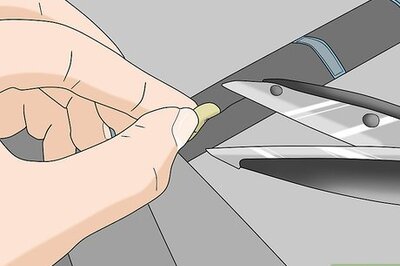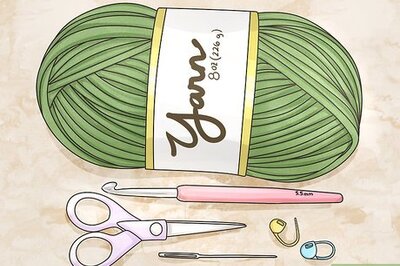
views
Scientists have created a highly flexible material that is tougher than steel, by combining hydrogels with woven glass fibre fabric, which may have a wide range of potential applications.
Efforts are currently underway around the world to create materials that are friendly to both society and the environment. Among them are those that comprise different materials, which exhibit the merits of each component.
Researchers from Hokkaido University in Japan focused on creating a reinforced material using hydrogels. Though such a substance has potential as a structural biomaterial, up until now no material reliable and strong enough for long-term use has been produced. Also read: World's First Metallic Hydrogen Sample Disappears
To address the problem, the team combined hydrogels containing high levels of water with glass fibre fabric to create bendable, yet tough materials, employing the same method used to produce reinforced plastics.
Researchers found that a combination of polyampholyte (PA) gels, a type of hydrogel they developed earlier, and glass fibre fabric with a single fibre measuring around 10 micrometres in diameter produced a strong, tensile material.
The procedure to make the material is simply to immerse the fabric in PA precursor solutions for polymerisation. When used alone, the fibre-reinforced hydrogels developed by the team are 25 times tougher than glass fibre fabric, and 100 times tougher than hydrogels - in terms of the energy required to destroy them. Also read: ESight Creates Electronic Glasses For Visually Impaired
Combining these materials enables a synergistic toughening. The team theorises that toughness is increased by dynamic ionic bonds between the fibre and hydrogels, and within the hydrogels, as the fibre's toughness increases in relation to that of the hydrogels.
Consequently, the newly developed hydrogels are 5 times tougher compared to carbon steel. "The fibre-reinforced hydrogels, with a 40 percent water level, are environmentally friendly," said Jian Ping Gong, from Hokkaido University in Japan.
"The material has multiple potential applications because of its reliability, durability and flexibility," said Gong. "For example, in addition to fashion and manufacturing uses, it could be used as artificial ligaments and tendons, which are subject to strong load-bearing tensions," she said.
The principles to create the toughness of the present study can also be applied to other soft components, such as rubber. Also read: Paytm Launches Paytm Mall - An Online Marketplace App(Follow MWC 2017 Full Coverage Here)




















Comments
0 comment